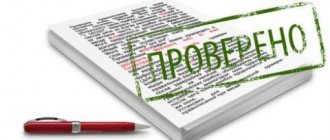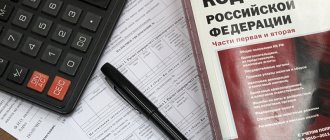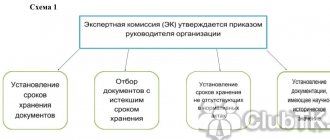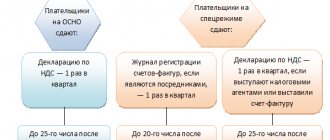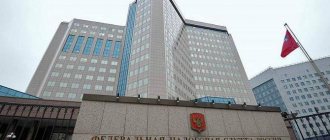To control the accrual and payment of insurance premiums, the Pension Fund and the Social Insurance Fund conduct desk and on-site inspections of policyholders (Article 33 of Law No. 212-FZ of July 24, 2009). All reports submitted to the funds are subject to desk audits. They do not require the presence of the payer of contributions; their purpose is to check whether the reporting has been compiled correctly and payment has been made. The period for conducting “camera cameras” is 3 months from the date of sending the report. On-site inspections are a more complex procedure that requires careful preparation.
How to find out in advance whether you are going to have an on-site inspection of the Pension Fund and the Social Insurance Fund, what the inspectors check, what documents they may require - all this will be discussed further.
Types of inspections and their periods
The Pension Fund of the Russian Federation, through its territorial divisions, conducts desk and on-site inspections of organizations (Article 33 of Law No. 212-FZ of July 24, 2009). In both cases, the goal is the same - to check whether contributions for pension and compulsory health insurance have been correctly calculated and paid. But the periods covered by such checks, as a rule, differ. You can quickly navigate all the timing and periods of on-site and desk inspections using the comparative table. If payments do not go to the Pension Fund, then read how to transfer money from a non-state pension fund.
As part of the desk audit, employees of the territorial office of the fund control only the period for which the organization compiled and submitted the calculation in accordance with the RSV-1 Pension Fund form (Part 1 of Article 34 of the Law of July 24, 2009 No. 212-FZ). For example, this is the calculation of the RSV-1 Pension Fund for the nine months of 2015. Then, as part of a desk audit of this calculation, the Pension Fund of the Russian Federation can check whether contributions have been calculated correctly only for these nine months. Although during the audit, fund employees can use information for other reporting periods.
But as part of an on-site inspection, fund employees have the right to check a period within three calendar years. Those that precede the year in which such an inspection was appointed (Part 9 of Article 35 of the Law of July 24, 2009 No. 212-FZ). And by the way, specific periods of the on-site inspection must be indicated in the decision to conduct it (clause 3, part 4, article 35 of the Law of July 24, 2009 No. 212-FZ).
Who is at risk of being blacklisted?
There are several categories of organizations that are at risk of being blacklisted:
- Firms that have inconsistencies in settlement actions within the framework of forms RSV-1, 4-FSS.
- Companies that have large expenses covered by the Social Insurance Fund.
- Organizations that do not provide the required set of reporting documents on time.
- Structures that provide payments to employees if they are not subject to insurance or pension contributions.
- Companies that apply benefits for the payment of SV.
- Corporations with debts in this direction for more than two reporting years in a row.
- Firms that provided data on the amounts of insurance premiums, and they decreased compared to the previous period.
- Organizations that require repeated adjustments.
Thus, if an organization meets at least a few of these criteria, the likelihood that these services will want to visit them increases.
General procedure for desk audit
The desk audit will begin from the day when the policyholder submitted a calculation to the Pension Fund of the Russian Federation in the RSV-1 Pension Fund form. Such an inspection may last three months from this date (Part 2 of Article 34 of the Law of July 24, 2009 No. 212-FZ).
When conducting a desk audit, fund employees are guided by Article 34 of the Law of July 24, 2009 No. 212-FZ and the Methodological Recommendations approved by the order of the Pension Fund Board of July 31, 2014 No. 323r.
A desk audit is carried out on the territory of the fund. Therefore, in addition to the calculation itself, fund employees can only use documents they already have during the inspection. Eg:
- calculations of insurance premiums presented earlier;
- documents that the policyholder submitted with the initial calculations - if we are talking about a desk audit of the updated calculation;
- extracts from accounting or tax registers;
- other documents received from the policyholder in the manner established by the Law of July 24, 2009 No. 212-FZ.
Fund employees have the right to request additional documents only if they identify any errors or contradictions in the submitted reports. In this case, they may require the organization to correct these nonconformities. And also has the right to request written or oral explanations.
Inspectors must inform the payer about any errors (inconsistencies) identified. At the same time, they will send a request to make corrections to the calculation. This requirement must be fulfilled within five working days. The period is counted from the day following the day when the organization received the demand via TKS or in person. If the request arrived by mail, then it is considered received on the sixth day from the date of dispatch, which is indicated in the stamp. Along with explanations, you can additionally submit documents to the fund that confirm the accuracy of the data. For example, extracts from accounting registers.
Such rules are established in parts 3–4 of Article 34 of the Law of July 24, 2009 No. 212-FZ.
In addition, during a desk audit, Pension Fund employees can call the payer of contributions to the territorial office of the fund to give oral explanations (clause 3, part 1, article 29 of the Law of July 24, 2009 No. 212-FZ). The call is issued in writing.
Situation: is it possible not to comply with the requirement of the Pension Fund of the Russian Federation to provide written explanations if this document does not indicate specific errors and (or) contradictions identified during a desk audit?
Yes, you can.
The Pension Fund of the Russian Federation has the right to demand written explanations from the organization only if there are errors and contradictions in the reporting. In this case, inspectors are obliged to inform the organization about specific identified inaccuracies and at the same time may require written explanations for them. This is stated in Part 3 of Article 34 of the Law of July 24, 2009 No. 212-FZ.
When there are no errors or contradictions, fund employees have no reason to demand an explanation from the policyholder. And if they nevertheless requested such without indicating specific errors and (or) contradictions, then this requirement may not be fulfilled. It is considered illegal.
Advice: It is still worth responding to the illegal request of the Pension Fund. Write that Pension Fund employees can demand clarification only if there are errors and contradictions in the calculation (Part 3 of Article 34 of Law No. 212-FZ of July 24, 2009). And since the received request does not say anything about errors, the request looks unreasonable and the organization cannot fulfill it.
Criteria for selecting policyholders
Since these services always act together, it is unrealistic to see them separately at certain inspections.
They have a general schedule, which can be found on the official resource of the regional branch of the FSS https://fss.ru/. They adhere to it in the process of carrying out control activities. Each fund strives to include policyholders in its plan list that are of particular interest to it. As a result, for 50% of companies the inspection is initiated by the Pension Fund, and for 50% of organizations - by the Social Insurance Fund.
There are several key criteria by which policyholders are selected:
- Discrepancies in reporting documentation. The appointment of an on-site audit was carried out during a desk audit. For example, if during the inspection service employees discover any flaws in the papers and inconsistencies, a scheduled on-site inspection will be scheduled in the future.
- Reduced wages. If, in comparison with the previous annual period, there has been a noticeable decrease in the payroll within the organization, this is also a reason for its inclusion in the inspection plan.
- Zero report. Organizations that submit zero declarations deserve special attention from inspectors. After all, the salary of an employee who honestly worked his time and complied with the standards cannot be less than the minimum wage. If accrued wages are expected, insurance contributions must also be present.
- Non-taxable amounts of money. In practice, such payments include state benefits, payments to persons temporarily staying in the territory of the Russian Federation, and foreign workers. The plan also includes companies that report significant amounts in these areas.
- Reduced tariffs. In particular, we are talking about organizations operating under a simplified taxation scheme. Companies with reduced tariffs that have not submitted documents for a desk audit have a particular risk of being included in the inspection plan.
- Existence of obligations. We are talking about debts. The plan will definitely include organizations that have certain arrears in contributions. At the same time, the FSS is interested in both organizations with a debt of 1000 rubles and large debtors.
- The scale of the taxpayer. From the entire list, the inspection structures will select persons who have the highest income (tax base), the maximum SPP indicator and the insurance fund.
- Large amounts of expenditure financed by services. If the manager of an enterprise spends a lot of money on dubious payments, this will be a reason to visit him when planning the next inspection.
- The verification period is approaching. Field activities are carried out once in a three-year period. Therefore, if a company has not been audited for three years in a row, employees will likely impose this measure.
This is not the entire list of criteria by which selection is carried out, but it is considered fundamental.
General procedure for on-site inspection
On-site inspections are carried out by fund employees, guided by Article 35 of Law No. 212-FZ dated July 24, 2009 and Methodological Recommendations approved by Order of the Board of the Pension Fund of the Russian Federation dated February 3, 2011 No. 34r.
Such a control event usually takes place on the territory of the contribution payer (i.e., the employing organization). But there is an exception. If the policyholder does not have the opportunity to provide premises for the inspection, then it will be carried out at the territorial office of the Pension Fund of Russia. This is stated in Part 1 of Article 35 of the Law of July 24, 2009 No. 212-FZ.
An on-site inspection begins with Pension Fund employees presenting the contribution payer with a decision to conduct an inspection. Such a document must indicate the composition of the inspectors and the period under inspection, which cannot be more than three years (Parts 4–9 of Article 35 of the Law of July 24, 2009 No. 212-FZ). Make sure that the inspectors have such a decision in their hands. And check your service IDs along with it. If they do not have such documents, then you have the right not to allow them to enter the organization’s territory for inspection.
You must familiarize yourself with the presented decision and put your signature. After this, the Pension Fund employee will present a request for the presentation of documents. By the way, if the inspection is carried out jointly with the Federal Social Insurance Fund of Russia, then each fund must have its own requirement. And these requirements will have to be fulfilled separately, independently of one another. That is, the documents will need to be prepared in two copies.
The on-site inspection ends on the day when the fund’s employees draw up a certificate confirming its conduct. In total, the on-site inspection cannot last longer than two months (Parts 11, 14, Article 35 of the Law of July 24, 2009 No. 212-FZ).
In some cases, the inspection period can be extended to four months, and in exceptional cases - to six months (Part 11, Article 35 of the Law of July 24, 2009 No. 212-FZ).
The basis for extending the on-site inspection to four and (or) six months may be:
- obtaining during the inspection information that indicates the presence of violations of the legislation on insurance premiums in the organization and requires additional verification;
- force majeure circumstances in the territory where the inspection is carried out;
- the presence of four or more separate divisions within the audited organization;
- failure to submit (untimely submission) by the organization of documents necessary for conducting an on-site inspection.
This is stated in Part 11.1 of Article 35 of the Law of July 24, 2009 No. 212-FZ.
To extend the period of an on-site inspection, the PFR branch that conducts it must send a reasoned request to the higher authority of the fund. Based on this request, the head (his deputy) of the higher authority will decide to extend the on-site inspection or refuse such an extension.
This procedure is provided for in Part 11.2 of Article 35 of the Law of July 24, 2009 No. 212-FZ.
Registration of results
On the last day of the inspection, the corresponding certificate is issued. Two months are allotted for drawing up the act, which serves as the result of the inspection and the basis for bringing to responsibility.
If the organization does not agree with this decision, it has the right to submit an objection and challenge the decision by attaching supporting documents to a written document. The materials are sent to fund managers, who make the final decisions.
A large seminar on audits in organizations is presented below.
Types of on-site inspections
There are two types of on-site inspections: scheduled and unscheduled.
The territorial branches of the Pension Fund of Russia can carry out scheduled on-site inspections only together with the territorial branches of the FSS of Russia. The schedule of such inspections for each reporting period can be found on the portal of your regional branch of the FSS of Russia. Please note that this schedule is subject to change.
Unscheduled on-site inspections are carried out only in certain cases. For example, during liquidation or reorganization of an organization. This was stated in the letter of the Ministry of Health and Social Development of Russia dated February 22, 2011 No. 19-5/10/2-1748. Unscheduled inspections can be carried out by both the Pension Fund of Russia and the Federal Social Insurance Fund of Russia separately.
By the way, in addition to fund employees, tax inspectors can also take part in joint audits. They are involved to check the validity of the application of reduced insurance premium rates if the organization:
- carries out activities in the field of information technology;
- provides engineering services.
This procedure is established by paragraph 2 of part 5 of article 33 of the Law of July 24, 2009 No. 212-FZ.
What does the FSS check?
There are several main points that exist in the activities of almost any company that may be of interest to the Social Insurance Fund:
- Calculation and payment of contributions (correctness of calculation, whether payment is timely);
- The procedure for spending money that the policyholder has accrued for insured events such as maternity leave, sick leave or parental leave;
- Vouchers;
- The procedure for spending money transferred when an employee receives an injury.
Thus, inspectors from the Social Insurance Fund ensure that the transferred insurance payments are justified, and that the contributions are calculated correctly and transferred on time.
For additional control of reports sent to the FSS, companies can check them using a special FSS check. It checks whether the employer has filled out the calculation correctly, determined the base, as well as the amount of accruals and payments. This check is carried out based on control ratios and is performed free of charge.
What documents may the Pension Fund require during an on-site inspection?
The Pension Fund of the Russian Federation may require from the payer of insurance premiums copies of documents that:
- are the basis for the calculation and payment of insurance premiums;
- confirm the correctness of calculation and payment of insurance premiums.
This is stated in paragraph 1 of part 1 of Article 29 of the Law of July 24, 2009 No. 212-FZ.
For example, Pension Fund employees may require copies of settlement, settlement and payment statements, pay slips, documents confirming employment in hazardous working conditions, civil contracts, etc.
Fund employees do not have the right to demand documents that are not related to the subject of the audit (clause 2.3 of the Methodological Recommendations, approved by order of the Board of the Pension Fund of the Russian Federation dated May 5, 2010 No. 120r). For example, they cannot require tax returns that record the amounts of insurance premiums.
The list of documents that fund employees can request during an on-site inspection is given in paragraph 7.4 of the Methodological Recommendations approved by Order of the Board of the Pension Fund of the Russian Federation dated February 3, 2011 No. 34r. These include, in particular:
- constituent documents;
- orders on accounting policies;
- licenses;
- calculations of accrued and paid insurance premiums;
- financial statements, including annual reports, explanatory notes thereto, audit reports;
- accounting (tax) registers for settlements with personnel and accountable persons, for social insurance and security, for cash accounting;
- cards for individual accounting of accrued payments (rewards) and insurance premiums;
- organizational and administrative documents, contracts and additional agreements to contracts (orders, collective agreements, employment contracts, etc.);
- bank and cash documents;
- primary documents confirming payments to personnel (for example, statements of accrual and payment of salaries, cash receipts, statements of advance payments, salaries, bonuses and other remunerations, bank statements for crediting funds to bank cards and accounts of individuals).
Additionally, during the on-site inspection, copies of individual registration documents in the compulsory pension insurance system may be requested.
The list of documents subject to verification is given in Appendix 1 to the Methodological Recommendations, approved by order of the Board of the Pension Fund of the Russian Federation dated February 3, 2011 No. 34r.
Situation: can the Pension Fund of the Russian Federation seize documents during an inspection?
No, he can not.
The list of control measures that officials of the Pension Fund of the Russian Federation can carry out during an on-site inspection is defined in Articles 36–37 of Law No. 212-FZ of July 24, 2009. Among them:
- access to the territory of the fee payer;
- requesting documents for inspection.
The law does not give Pension Fund employees the right to seize documents. Therefore, even if they have reason to believe that documents may be destroyed, hidden or changed, fund employees (unlike tax inspectors) cannot carry out such an event.
How to prepare for the test?
In a number of cases, when checking the Social Insurance Fund, violations related to the execution of documents are revealed. Documents filled out incorrectly may not be recognized as expenses. An enterprise that has received a notification of inspection (decision) must carry out control of documents to ensure the availability and completeness of filling in the details.
| Document forms | Required details |
| Payroll statements | Signatures of responsible persons |
| Payrolls | Signatures of employees who received wages in cash |
| Expense cash orders for one-time payments | Completeness of filling (amounts in words, passport data), signatures of persons |
| Time sheets | Signatures of the manager and responsible persons |
| Certificates of incapacity for work | Stamp, seals of a medical institution, doctor and calculation |
| Orders | Signatures confirming the acquaintance of the person |
| Certificates, calculations, statements | Correctness of filling |
The authority of responsible persons signing documents must be confirmed by orders on appointment or temporary performance of duties. Before the inspection begins, it is necessary to separate documents related to the inspection from materials that are not of interest to the inspectors. If there is arrears in contributions to the Social Insurance Fund, it is necessary to promptly repay the debt.
How to submit documents at the request of the Pension Fund
At the request of the inspectors, copies of documents can be submitted either on paper or electronically. Paper copies must be certified. To do this, you need to put the inscription “Correct” on them, indicate the position of the person who certified the copy, his personal signature and transcript of the signature (initials and surname), put the date of certification and the seal of the organization. This procedure is provided for in paragraph 3.26 of GOST R 6.30-2003, approved by Decree of the State Standard of Russia dated March 3, 2003 No. 65-st.
Each copy of the document must be certified. Binders consisting of copies of several documents cannot be certified.
Documents that were requested during the inspection must be submitted within 10 working days from the date of delivery of the relevant request (Clause 4, Part 2, Article 28, Part 5, Article 37 of the Law of July 24, 2009 No. 212-FZ) .
Attention: if you do not submit documents at the request of inspectors within 10 working days, the organization or entrepreneur will be fined 200 rubles. for each unsubmitted document (Article 48 of the Law of July 24, 2009 No. 212-FZ). And the responsible employee of the organization, in particular its head, faces a monetary penalty in the amount of 300 to 500 rubles. (Part 3 of Article 15.33 of the Code of Administrative Offenses of the Russian Federation).
What do inspectors do if violations are detected?
If during the on-site inspection, violations of the legislation of the Russian Federation on compulsory social insurance were revealed in terms of the correctness of calculation, completeness and timeliness of payment (transfer) of insurance contributions to state extra-budgetary funds, the territorial body of the Pension Fund of the Russian Federation in accordance with the requirements of the Methodological Recommendations:
- carries out the selection of documents confirming separately each fact of identified violations;
- makes additional calculations of insurance premiums;
- forms proposals to hold the insurance premium payer accountable for committing an offense or to refuse to hold the insurance premium payer accountable for an offense, as well as to eliminate identified violations.
For each identified fact of violation of the law, copies of the relevant documents must be attached to the inspection materials.
Selection of people being checked
The policyholder risks being included in the plan of those being audited (Section II of the Methodological Recommendations) if: - has arrears in insurance premiums (more than two reporting periods in a row), violates the deadlines for submitting calculations; — based on the results of desk audits, the following facts were revealed: — a decrease in the amounts of accrued insurance premiums (compared to the previous period) with a constant number of working insured persons; — the presence in the calculation of significant amounts that are not subject to insurance premiums in relation to the amounts of payments and other remuneration accrued by the payer in favor of individuals; — a sharp change in the number of employees in the organization during the billing period; — applies reduced rates of insurance premiums (including along with the use of a general tariff); — repeatedly made changes and adjustments to the calculations for accrued and paid insurance premiums; — information was received from the Federal Tax Service of Russia about the organization’s participation in schemes to minimize obligations to pay insurance premiums. Such information may also be requested from the tax authorities in accordance with the Agreement on interaction between the Federal Tax Service and the Pension Fund of the Russian Federation dated February 22, 2011 N MMV-27-2/5/AD-30-33/04sog (communicated by the Letter of the Federal Tax Service of Russia and Pension Fund of February 22, 2011 N PA-4-2/ [email protected] /TM-30-25/1769). Based on the criteria for selecting insurance premium payers in the fourth quarter of the year preceding the year in which on-site inspections are planned to be carried out, an annual schedule for their conduct is formed. At the same time, policyholders who do not conduct financial and economic activities are not included in the schedule. Consequently, according to the specified criteria, in the fourth quarter of this year, policyholders who make payments to individuals will be selected to include them in the schedule of on-site inspections in 2012. On-site inspection of the insured in most cases is carried out on its territory. Consequently, the payer of insurance premiums must provide pensioners with premises for conducting an on-site inspection. If he does not have such an opportunity, then an on-site inspection can be carried out at the location of the territorial branch of the fund (Clause 1, Article 35 of Law No. 212-FZ). The basis for conducting an on-site inspection is the decision of the head (deputy head) of the territorial branch of the Pension Fund of the Russian Federation at the location of the organization (separate unit). The decision is drawn up in form 9-PFR (Appendix No. 14 to Order of the Ministry of Health and Social Development of Russia dated December 7, 2009 N 957n) in two copies. The first copy is handed over to the organization (its authorized representative) for review on the territory (premises) of the insured being inspected or on the premises of the territorial office of the Pension Fund of the Russian Federation (depending on the location of the inspection). In the latter case, authorized representatives of organizations are summoned by sending a notification of summoning the insurance premium payer in Form 7 (Appendix No. 11 to Order No. 957n). The second copy of the decision is attached to the materials of the on-site inspection (clause 3.5 of the Methodological Recommendations). Upon first appearance, inspectors are required to present their official identification and the decision of the manager (his deputy) to conduct an on-site inspection. On-site inspections of separate divisions of organizations that have a separate balance sheet, current account and accrue payments and other remuneration in favor of individuals (branches, representative offices) can be carried out both on the initiative of the territorial office of the Pension Fund of the Russian Federation at the location of the separate division, and as part of an on-site inspection of the entire organization (clauses 3 and 12 of Article 35 of Law No. 212-FZ). The basis will be the decision to order an inspection in the first case - by the local branch of the fund, in the second - by the Pension Fund of Russia branch at the location of the head office. When inspecting an organization, including its separate divisions, a report on the results of the inspection is drawn up taking into account the facts established during the inspection of separate divisions. In this case, copies of the on-site inspection report of the payer-organization and the decision made based on the results of consideration of the inspection materials are sent to the territorial branches of the Pension Fund of the Russian Federation that took part in the inspection of separate units at their location. In the case of an independent inspection of a separate division of an organization, by analogy, copies of the on-site inspection report of the division and the decision made are sent to the territorial office of the Pension Fund of the Russian Federation at the location of the parent organization (clause 6.3 of the Methodological Recommendations). Simultaneously with the familiarization of the payer of contributions with the decision to conduct an inspection, the official conducting it submits a request for the submission of documents necessary for conducting an inspection in Form 14 (Appendix No. 21 to the mentioned Order No. 957n, clause 3.7 of the Methodological Recommendations). The policyholder must submit documents in the form of copies certified by him. Requesting notarized copies is not allowed. If necessary, inspectors have the right to familiarize themselves with the originals, but they can only do this on the territory of the person being inspected (clauses 2, 3, 4 of Article 37 of Law No. 212-FZ). He is given 10 working days to collect these documents. It is recommended that inspectors accept all documents submitted by a business entity according to the inventory, certified on both sides (clause 4.6 of the Methodological Recommendations). The policyholder is given the opportunity to postpone the date specified in the request for submission of the requested documents. A corresponding written request indicating the reasons for the delay and the period during which the requirement can be fulfilled must be sent to pensioners within a day after receiving the request (clause 4.9 of the Methodological Recommendations). The management of the PFR branch must render its verdict on this matter within two days from this moment (clause 6 of Article 37 of Law No. 212-FZ). The decision made is drawn up in Form 15 (Appendix No. 22 to Order No. 957n) (clause 4.10 of the Methodological Recommendations). Failure to submit or untimely submission of documents is grounds for prosecution in the form of a fine of 50 rubles. for each document not submitted (Article 48 of Law No. 212-FZ). As we can see, the requirement to submit documents necessary for the inspection is given to the policyholder simultaneously with familiarization with the decision to schedule an on-site audit. Consequently, inspectors of the Pension Fund of the Russian Federation carefully prepare for visiting policyholders; even before the start of the inspection, they determine what documents they will need. This is also indicated by paragraph 7.1 of the Methodological Recommendations. It instructs inspectors to analyze, before going on an inspection, all information available in the Pension Fund department about the policyholder, to create a register of payments of insurance premiums, requests to other organizations to provide additional information and documents confirming the correctness of calculation and timely payment of payments to extra-budgetary funds. The volume of documents and information about the activities of the insured required for inspection is determined by the PFR inspectors independently, including based on the state of the accounting records of the person being inspected, the degree of probability of detecting violations, etc. This implies an unlimited number of requirements set by inspectors during an on-site inspection (clause 4.2 of the Methodological Recommendations ).
Leadership Instructions
At the beginning of this year, the Board of the Pension Fund of the Russian Federation issued Methodological Recommendations for organizing on-site inspections of insurance premium payers (approved by Order No. 34r dated 02/03/2011, hereinafter referred to as the Methodological Recommendations). In this regard, the Temporary Methodological Recommendations for organizing on-site inspections of insurance premium payers (introduced by Order of the Board of the Pension Fund of the Russian Federation No. 127r dated May 11, 2010) were declared invalid. The Methodological Recommendations address the issues of planning and conducting on-site inspections by territorial branches of the Pension Fund of the Russian Federation only of insurance premium payers who make payments and other remuneration to individuals. Their effect applies to legal relations during on-site inspections for the billing period from January 1, 2010. Let us recall that when conducting an on-site inspection on the payment of insurance contributions to the Pension Fund, a check is simultaneously carried out on documents related to the appointment (recalculation) and payment of compulsory insurance coverage for the compulsory pension insurance and provision of information on individual (personalized) accounting of insured persons in accordance with the Federal Law of December 15, 2001 N 167-FZ “On Compulsory Pension Insurance in the Russian Federation” (clause 7 of Article 35 of Law N 212-FZ).

